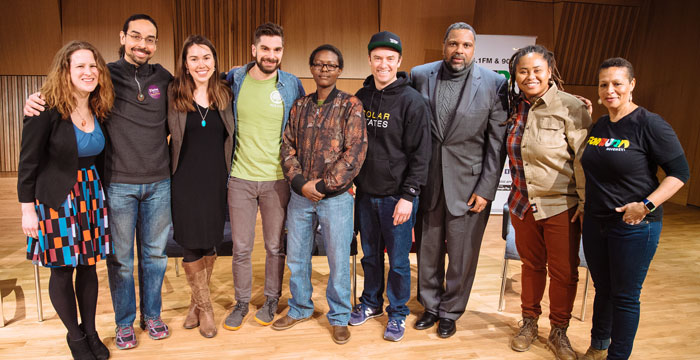
Philly’s Green Economy has Opportunities: Event Recap
Last Saturday, Green Philly teamed up with WURD Radio to co-host an event exploring jobs in the green economy at the Pennsylvania Academy of Fine Arts’ John and Richanda Rhoden Arts Center.
We were joined by speakers and numerous organizations shared their experiences, job opportunities and creating opportunitites in Philadelphia.
If you missed the event, here’s a recap.
Organizations working on THE FUTURE OF WORK IN PHILLY’S GREEN ECONOMY 3/2/19
First, we opened the event to community groups sharing their opportunities for careers and to get involved.
Organizations such as the Clean Air Council, Esperanza, Trash Academy, New Voices for Reproductive Justice, Solarize Philly, the Office of Sustainability, and the Susquehanna Clean Up/Pick Up Inc tabled in the gallery.
Russell Zerbo from the Clean Air Council said people don’t realize the presence of green jobs already in Philadelphia due to a misconception of what the green economy is.
“They think of it more of commercial products and sustainability focused marketing, but the people who operate our public transportation, our city regulators, and people doing these public construction projects are the green economy,” he said.
Alexa Ross from Philly Thrive, a group of Philadelphians defending their community against the oil refinery in South Philadelphia, said the right to breathe is directly related to the green economy. If the refinery is eventually shut down, she believes that is an opportunity for a better replacement.
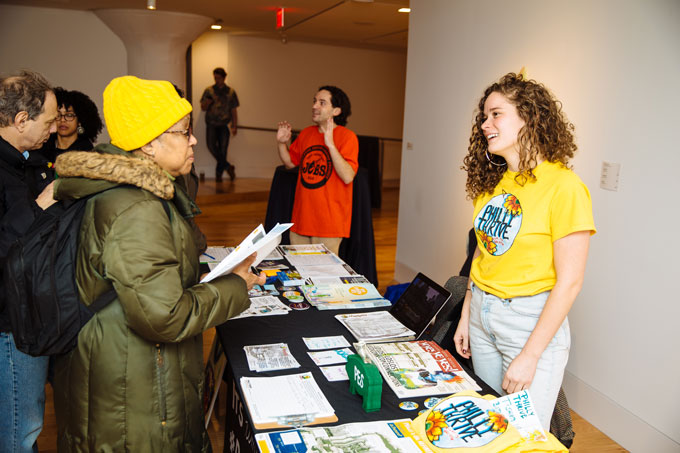
“We don’t want just the refinery to transition to something that doesn’t
pollute people and jobs where people aren’t putting their health on the line,”
she said, “but we also want a total transformation of the economy.”
Ross sees value in having community events such as this in order to build upon a greater movement.
“There is a rich ecosystem of organizations and leaders across Philadelphia that are beginning to form a robust environmental justice movement,” Ross said. “To be in the same space and to be with all these organizations just makes our movement stronger.”
Ron Whyte, Project Coordinator for the Mural Arts initiative Trash Academy, said green events are necessary to push environmental issues into public consciousness so people can educate themselves.
By focusing on the environment, he sees a future in green jobs in Philadelphia.
“We know in Philly there’s so much trash pollution and right now 50% of our recycling is being burned,” Whyte said. “There are jobs that could be created cleaning up the city and expanding our zero-waste infrastructure.”
Takeaways from our Speakers
Seven speakers gave flash talks (TED-style ), followed by a panel discussion. What did they share?
Jerome Shabazz, co-founder of JASTECH and the Overbrook Environmental Education Center, wants youth to consider their own neighborhoods as a part of the environment and that there is other infrastructure underneath their feet that needs to be maintained.
“The maintaining of that is an opportunity for work, it is an opportunity to take care of ourselves, to be able to have a greater role in the quality of our water, in the quality of our air, in the quality of our land,” he said.
The Overbrook Center has created job opportunities for youth that have participated in their programming.
“These students are now in careers and opportunities that enable them to live in a way in which their work is benefitting the quality of their community’s life,” Shabazz said.
The “Green New Deal” of the Booming Solar Industry
The solar industry is expanding, and ripe in Philadelphia. Nationally, 2 percent of eligible rooftops have solar, which means 98 percent of eligible roofs do not! This creates a business opportunity with hiring locally.
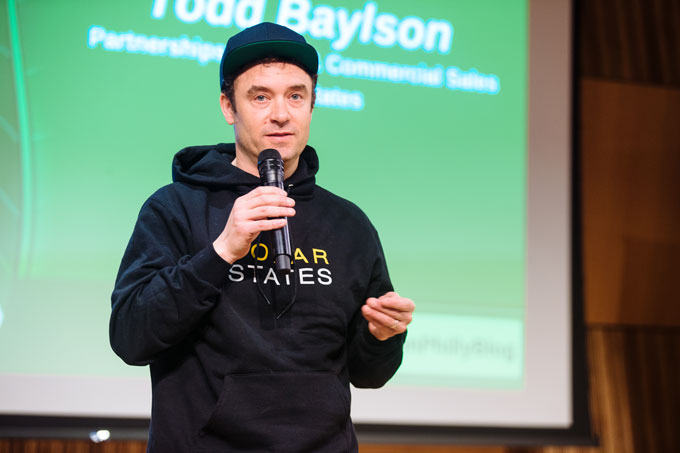
Todd Baylson, of Solar States, says they are fighting the reputation that solar is too expensive. He said pricing has come down on solar equipment by 80 percent in the last decade. Solar States partners with Solarize Philly to bring the cost of buying solar down.
Baylson also said Pennsylvania has an opening for an opportunity for solar energy to have public policy approved soon.
Ky Sanders, a solar technician, installer, and trainer for Solar States, has been working in the solar field for three years. She has made solar accessible to people in the community by training people in different programs including pilot programs through the School District of Philadelphia.
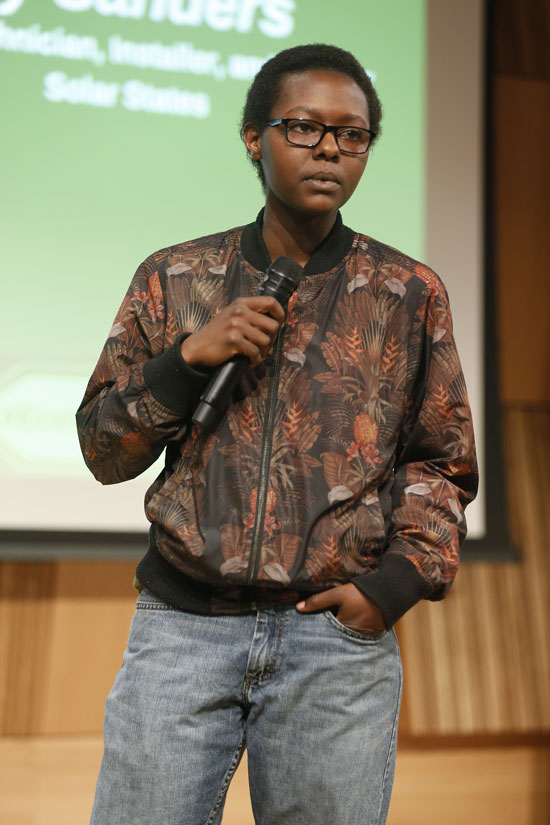
Sanders said there are opportunities in the city for solar, but there are no trainings in the schools or huge awareness as she feels it should. She advocates for STEM to be prioritized in schools and that children need to learn about solar early on in order to create more opportunities.
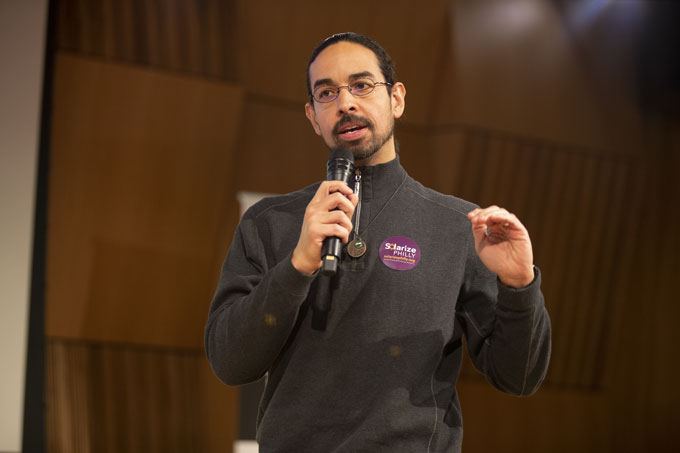
Frank M. Ortiz, a founding member at non-profit solar install cooperative Serenity Soular, said the world needs to trust each other more. With a cooperative, you are relying on the people you are working with to think, consider, evaluate, judge, and create. If that is done effectively, you will come out with a superior product.
Ortiz said Serenity Soular hires people locally, giving people the opportunity to take care of themselves by bringing revenue in, and supplies energy to residents to let their cost of living to go down so they’re in a better position to do their part for the environment.
Other Ways to Integrate Social Impact in Business
Tess Hart, co-founder
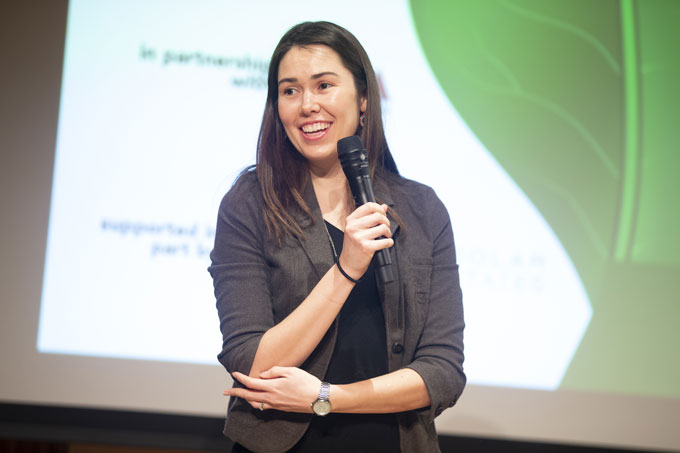
The brewery is an example of what a green business in the economy can be. Triple-Bottom Brewing practices fair chance employment and provides professional development and leadership skill building opportunities.
Hart spoke on the ways the company is considering sustainability such as renewable energy credits, using all LED lighting, having separate tanks for cleaning solutions and reusing water. The brewery will also have a trash room to sort each individual waste stream to keep it out of the landfills as much as possible.
Justin Trezza, Director of Programs at the Pennsylvania Horticultural Society, gave a brief history lesson on Philadelphia’s past of allotting land to residents to grow on. PHS has a land-care program taking care of 12,000 of the vacant lots in Philadelphia and collaborates with community partners and returning citizens.
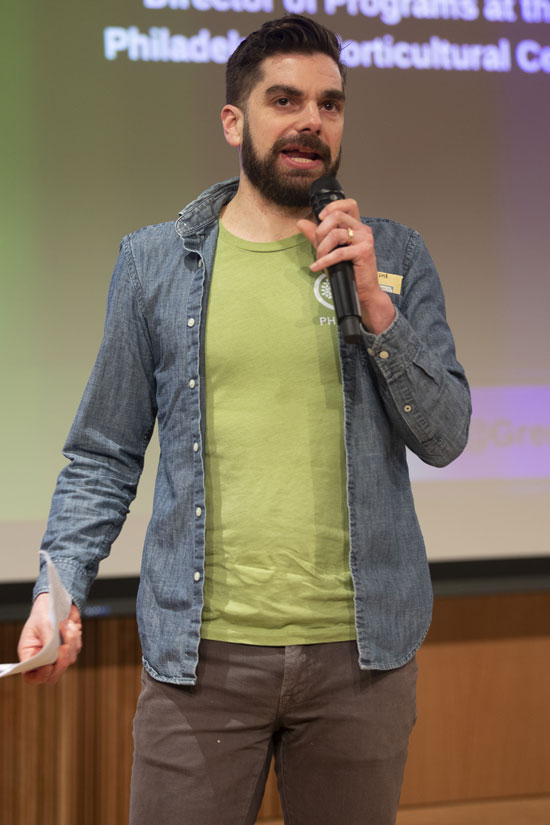
“The simple act of just cleaning and greening a vacant lot drastically reduces not only violent crime, but increases mental health,” he said.
Trezza said that by taking care of these vacant lots, this can lead to growing on them and creating a localized economy where citizens are growing their own healthy and organic food.
Jeannine Kayembe, co-founder and co-CEO of Urban Creators said the organization has cultivated a culture on what sustainability looks like.
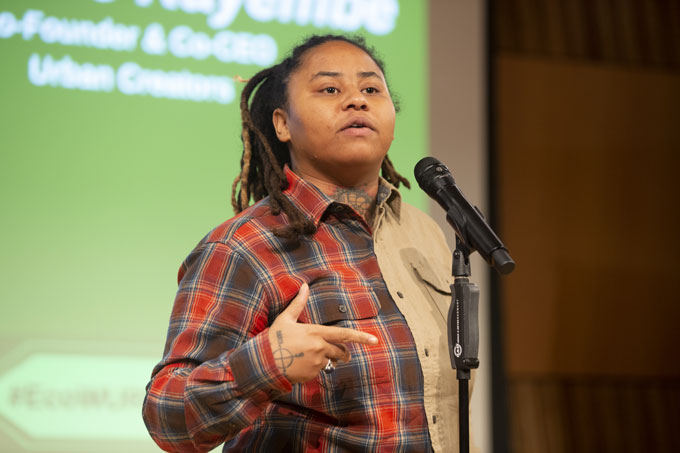
“Sustainability looks like young boys in the hoods getting jobs, single mothers having homes to even put solar panels on top of,” she said.
Kayembe said that when working with young people around sustainability, it’s important to tell them that their other passions whether it be art or design can be a medium for them to speak out. As she said,
“There are not too many black and brown people being put on these pedestals that are talking about sustainability. The fact that we have enough courage to do so is a viable job for a young person to do so in this economy.”








